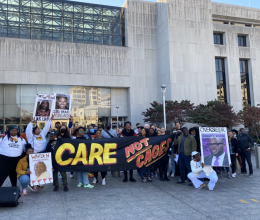The main issue in this federal employee’s appeal of a suspension without pay was whether the appeal itself had been timely filed. The statute provides that an appeal to the court “must be filed within 60 days after the date the petitioner received notice of the final order or decision of the Board.” Mr. Wechsler was representing himself when he filed his appeal within 60 days after he received notice, but 62 days after the lawyer who had represented him before the Board—but who no longer represented him—had received it. He mailed his appeal in time to arrive within 60 days, but the mail was delayed in reaching the court, presumably because mail to the court, in these post 9/11 anthrax scare days, is diverted to a remote facility where it is screened for security purposes. We agreed to represent Mr. Wechsler because it seemed to us unfair that a pro se litigant cannot rely on the plain language of a statute, or can be put out of court because his mail to the court is delayed by the government for its own purposes.
After we filed our brief in October 2007 the court of appeals assigned the case to its mandatory mediation program. With the mediator’s assistance the case was settled and in June 2008 Mr. Wechsler received a monetary payment for the time of his suspension. That fall, his security clearances were also restored, and he was restored to his job.


